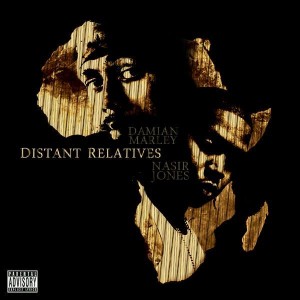
Nas & Damian Marley
Distant Relatives
(Def Jam; 2010)
By Chris Molnar | 19 May 2010
For all their sermonizing faults, Welcome To Jamrock and the past few Nas albums are bracing cold showers in the context of mainstream rap, this place where Damian Marley and Nas hide in the corners like cockroaches. Like the worst De La Rocha jams, or Dylan-aping folk-singing, or brainless anarcho-punk, they seem to exist and to prosper to introduce teenagers to a deeper, wider worldview via the hatchet-like emotional subtlety of the emo, post-grunge, and NOW!–ready pop to which said teenagers are presumptuously used. Bitches and hoes are replaced with whitey and ignorant rappers—and just as presumptuously, voilà: self-righteousness.
Distant Relatives does all this and yet somehow, occasionally, articulates a naïve joy in social awareness which can be contagious. This happens when the “every child deserves to learn” idea is communicated by something other than sledgehammer exposition, when even a hint of intelligent, socially conscious mainstream pop is satisfying on some level. And background, of course, helps. K’Naan (who appears here a couple times) does pretty much the same thing on his own albums, with different Mulatu Astatke samples, yet suffers under the burden of “authenticity”; his compelling personality and backstory can feel wasted as he replaces L.A. and New York with Nigeria and Ghana while rapping over the guy from Maroon 5. Failed selling-out is maybe the most depressing thing in the world.
On the other hand, hearing an Amadou & Mariam sample translated through two MCs who have made a career out of overcompensating for success they can no longer justify…I can’t help but feel good. Like with RZA’s The World According To RZA (2003), an album built on the funny fake spectacle of pop stars watching MTV Europe for the first time, there’s an unexpected sense of real discovery writ large across it. And unlike anything else here is first single “As We Enter,” which finds our heroes rapidly trading lines over an Astatke sample while keeping it under three minutes (which should be a requirement for this sort of thing). “Must be dementia that you ever thought you could touch our credentials / What’s the initials?” asks Nas, briefly unhinged from his later imperative to “Appreciate the things you work hard for / And count your blessings.”
While that first track showcases an actual (if unintelligible) flow on Marley’s part, and the potentially invigorating nature of an overarching theme, the rest is more along the lines of “Count Your Blessings,” a brain-damaging echo chamber of misguided sincerity. “My Generation,” featuring two of the most over-used rap tropes of the last ten years—a children’s choir and Lil Wayne—is maybe the record’s nadir, using “change” (in ways that makes Obama’s slogan sound specific) over cheap serious-song piano. “Art is your creation,” K’Naan reminds us in the condescending closer “Africa Must Wake Up,” a sentiment which comes across as vaguely offensive, even with the guy’s questionable stamp of native approval. Wind-chimes and a pocket-sized guitar solo again indicate “seriousness,” as if the bland humorlessness didn’t already.
Still, as much as the warped good intentions of the album can get exhausting and embarrassing, Nas and Damian’s creative side remains pure enough to carry one through the lunkheaded didacticism. The ethio-jazz of “Nah Mean” is perfectly complemented by their old school pride (Nas, again: “Females never bid us farewell, they with us / ’Cause we arrive on the scene just like a high beam”), and the straight reggae of “Land of Promise,” featuring a resurrected Dennis Brown, actually manages to namedrop various African countries without becoming a confused concert shout-out. As long as you’re prepared for Stephen Marley attempting to guide “Ghetto youth / Through this cold world” over gently plucked guitar (as well as songs self-explanatorily titled “Leaders” and “Friends”—what, no “Miracles”?) there’s something strangely addictive about Distant Relatives. Just be warned, it’s the same kind of high as joining the social justice committee in college: well intentioned, if mostly guilt-based and dimly guileless.





